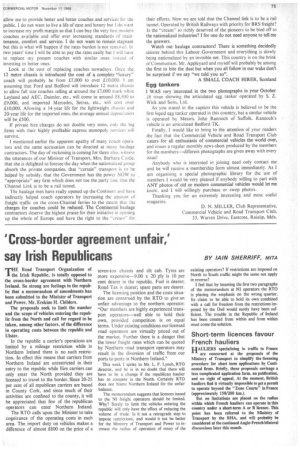'Cross-border agreement unfair,' say Irish Republicans
Page 77

If you've noticed an error in this article please click here to report it so we can fix it.
BY IAIN SHERRIFF, MITA
rr HE Road Transport Organization of the Irish Republic, is totally opposed to the cross-border agreement with Northern Ireland. So strong are feelings in the republic that a memorandum of amendments has been submitted to the Minister of Transport and Power, Mr. Erskine H. Childers.
The proposals seek to limit the number and the scope of vehicles entering the republic from the North and call for regard to be taken, among other factors, of the difference In operating costs between the republic and Ulster.
In the republic a carrier's operations are limited by a mileage restriction while in Northern Ireland there is no such restriction. In effect this means that carriers from Northern Ireland are unrestricted in their entry to the republic while Eire carriers can only enter the North provided they are licensed to travel to the border. Since 20-25 per cent of all republican carriers are based in County Cork, and since much of their activities are confined to the county, it will be appreciated that few of the republican operators can enter Northern Ireland.
The RTO calls upon the Minister to take cognizance of the operating costs in each area. The import duty on vehicles makes a difference of almost .E800 on the price of a seven-ton chassis and tilt cab. Tyres are more expensive-9.00 x 20 ply is 10 per cent dearer in the republic. Fuel is dearer; Road Tax is dearer; spare parts are dearer.
The licensing position and the costs situation are construed by the RTO to give an unfair advantage to the northern operator: "Our members are highly experienced transport operators—well able to hold their own, provided competition is on equal terms. Under existing conditions our licensed road operators are virtually priced out of the market. Further there is a danger that the lower freight rates which can be quoted by Northern road transport operators may result in the diversion of traffic from our ports to ports in Northern Ireland."
This week I spoke to Mr. L. F. Lynch, RTO director, and he is in no doubt that there will have to he a change if the republican haulier has to compete in the North. Certainly RTO does not blame Northern Ireland for the unfair balance.
The memorandum suggests that licences issued to the NI freight operators should be limited. Why? Surely to limit the vehicles entering the republic will only have the effect of reducing the volume of trade. Is it not a retrograde step to impose restrictions, and would it not be better for the Ministry of Transport and Power to increase the radius of operation of many of the
existing operators? If restrictions are imposed on North to South traffic might the same not apply in reverse?
I feel that by beaming the first two paragraphs of the memorandum at NI operators the RTO is placing the emphasis on the wrong quarter. Its claim to be able to hold its own combined with a call for freedom from the restrictions imposed by the Dail would surely have been sufficient. The trouble in the Republic of Ireland has been created from within and from within must come the solution.
Short-term licences favour French hauliers
HAULIERS specializing in traffic to France
are concerned at the proposals of the Ministry of Transport to simplify the licensing procedure for short term applications by Conti. nental firms. Briefly, these proposals envisage a less complicated application form, no publication, and no right of appeal. At the moment, British hauliers And it virtually impossible to get a permit to operate beyond the "Zone Courte" in France (approximately 150/200 km.).
But no limitations are placed on the radius within which French hauliers can operate in this country under a short-term A or B licence. This point has been referred to the Ministry of Transport by the RHA, and will probably be considered at the continued Anglo-French bilateral discussions later this month.
































































































































